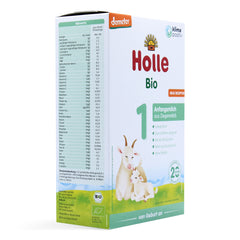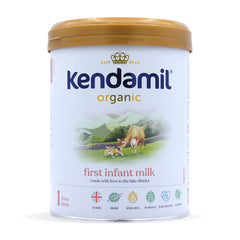Is It Safe to Mix Different Baby Formulas?
28 hours of research 3 minute read

Every parent has a different feeding journey – some parents are able to breastfeed, some easily find formulas that match their babies, and some parents take longer to find that right fit.
As you try to get your footing in your new journey, you probably have several brands of formula for testing, baby formula gifts from family and friends, and some opened packs that might not have agreed with your baby.
Some parents buy in bulk and at times their babies have outgrown a stage - leaving them with a few more unopened packs.
We understand that these situations can happen. In relation to these, one of the most common questions that we hear is if they can mix different baby formulas. We prepared this article for you to share best practices, discuss the risks, and provide alternatives.
Is it safe to mix different baby formulas?
Manufacturers do not recommend mixing baby formulas. Each baby formula is created for a specific goal. While baby formulas can have the same ingredients, you will notice that there are variations in the dosage and nutritional content. Mixing formulas might affect the nutrient intake of your baby and while it may not be visible in the beginning, mixing baby formulas may create an imbalance. This means that the babies who are fed with different baby formulas might not be getting all of the nutrients they need to grow and thrive.
Can you mix baby formulas in one bottle?
We do not recommend mixing different baby formulas in a bottle. Each baby formula comes with a unique water-to-powdered baby formula ratio.
All baby formulas come with a specifically manufactured scoop that indicates how much powder to add to water when preparing bottled formulas. While each scoop might look alike, scoops can vary in size. Note that a scoop of baby formula is carefully researched to meet the nutritional requirements of a baby. By combining two different formulas, your baby can either be getting overnourished or undernourished which is potentially harmful, especially if it been that way for a long time.
Additionally, there is no researched amount of water in a mixture of two different formulas. This can lead to overconcentration or dilution of baby formula:
- Taking overly concentrated baby formulas can lead to dehydration which can lead to an imbalance in salt and water in a baby’s body, brain injury and seizures, and kidney problems.
- Taking a diluted baby formula can lead to loss of weight or gradual weight increase, developmental milestone delays, and possibly water intoxication.
Can you mix cow and goat milk baby formulas?
We do not recommend mixing cow and goat milk baby formulas.
Some babies find goat milk to be stronger, creamier, and gamier than cow milk. Since babies have sensitive tastebuds, they can identify variations in flavor. Combining the two formulas in one bottle can turn off babies, especially if they are used to drinking cow milk-based baby formula.
Can you mix baby formulas from the same brand?
Regardless of brand, we do not recommend mixing two different formulas.
Also, you should not combine any milk with a specialty formula. Specialty formulas are specially created for babies who have special digestive concerns like allergies and reflux among others. Mixing another type of formula, even if it is from the same brand, will alter its nutritional profile:
- If you combine any formula with anti-reflux milk, it might dilute the formula and will no longer prevent reflux.
- If you combine a regular cow’s milk formula with a hypoallergenic and/or hydrolyzed formula, it will potentially harm a baby with a cow’s milk protein allergy.
Can you mix baby formulas of different brands?
We do not recommend mixing baby formulas of different brands.
Mixing baby formulas poses a lot of risks since it is not backed by research. A mixture of one or more baby formulas from different brands means that there could be too much or too little nutrient content per prepared formula.
Likewise, baby formulas can have different ingredients. In case your baby has some allergies or sensitivities - it will be difficult to identify which is triggering it if your baby is drinking a combination of different variants from different brands.
Common scenarios where parents ask, “can you mix two different formulas together?”
Whether your situation falls on the scenarios below or not, please note that we always recommend following the feeding and preparation guide from the manufacturers.
We have listed the scenarios below:
- I was gifted with different baby formulas during my baby shower.
- I want to transition to another brand of formula.
- I need to transition to the next stage and I have some leftover packs.
- I am traveling and my baby’s formula is not available in my current location.
- I want my baby to take starch during the evenings so will sleep longer.
Considerations when mixing baby formulas
Parents should be aware of your baby’s digestive needs. If your baby has any of the following, you have to be extra mindful if you are considering mixing baby formulas:
- Allergies and Sensitivities – A mixture of two different formulas can seriously harm babies with allergies and sensitivities.
- Medical Condition – Babies with medical conditions require specialty formulas.
- Low-calorie or High-calorie needs – Please consult your pediatrician specific to the caloric needs of your baby.
- Reflux and Colic – Babies need specialty formulas for these, too.
Instead of mixing two different formulas in a bottle, you can try preparing two separate bottles following the instructions of the manufacturers. This will allow you to observe any reaction of your baby to the formula.
Should I mix different baby formulas?
Each formula comes with its own set of feeding guides and preparation instructions. We always recommend following the guidelines of the manufacturers. But if you notice that your baby has different needs, please consult with your pediatrician for guidance specific to your baby.
Most Popular European Baby Formulas
Sources:
- https://www.medicinenet.com/will_mixing_formula_hurt_my_baby/article.htm
- https://www.wendysueswanson.com/mix-and-match-goldilocks-formula/
- https://www.cdc.gov/nutrition/infantandtoddlernutrition/formula-feeding/infant-formula-preparation-and-storage.html
- https://www.youtube.com/watch?v=GYVGwJGycF8
- https://www.mumsnet.com/talk/breast_and_bottle_feeding/3170792-Can-you-mix-formula-brands
- https://www.rakshaskitchen.com/is-it-safe-to-mix-and-match-infant-formulas/
- https://www.mumsnet.com/talk/breast_and_bottle_feeding/3170792-Can-you-mix-formula-brands











Kai Skai.s -
This completely changed my perspective on how formulas can be adjusted to fit a baby’s needs. I used to think mixing formulas was a no-go, but now I see how some parents combine brands or types to help with specific issues like reflux or gas. It’s good to know there are safe ways to do this if done thoughtfully.
Santiago B -
Could someone explain how mixing different baby formulas might affect my baby’s digestion? I’m worried it could upset her tummy since she has a sensitive stomach. Are there certain ingredients or things I should watch out for when mixing formulas? I’d really appreciate any tips to help me make the best choice for my baby’s health.
Perry L -
I’d love to hear more about the best way to switch between formulas if needed! Sometimes one formula doesn’t sit well with my baby, and I wonder if it’s okay to transition gradually or if I should mix them for a smoother switch. I know every baby is different, but I’d love to hear what’s worked for other parents. Also, are there certain ingredients I should watch out for when changing formulas? Just want to make sure I’m making the best choice for my little one!